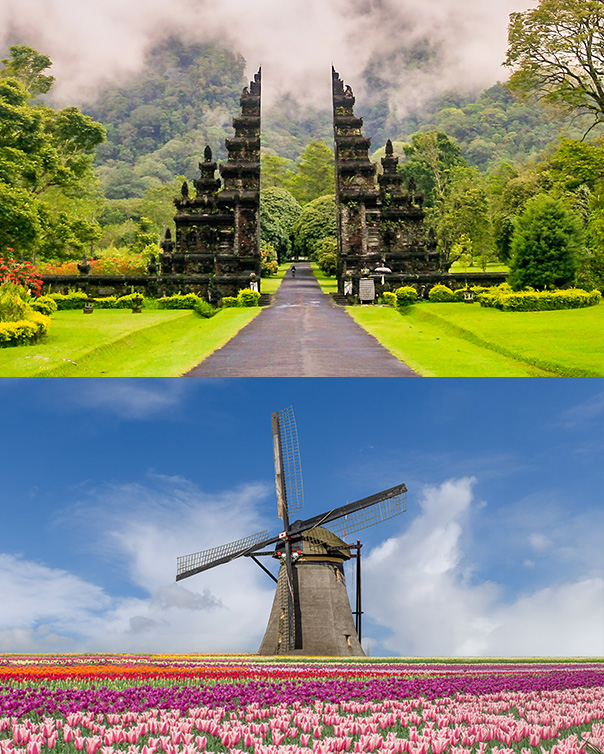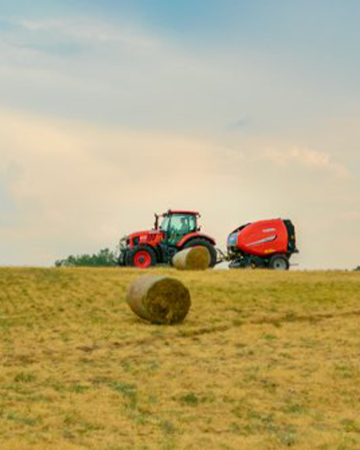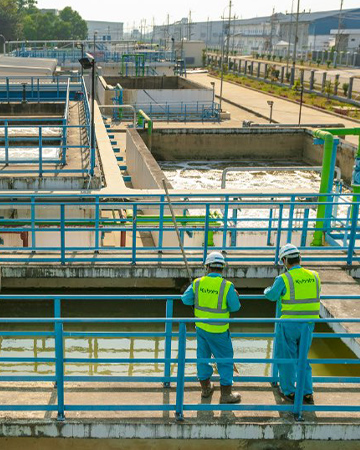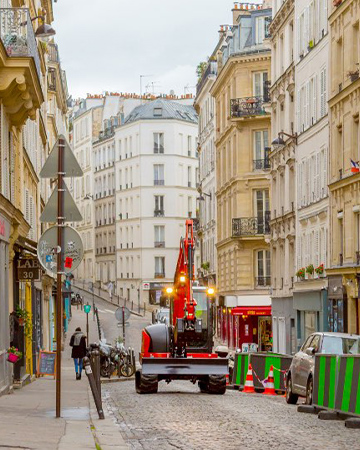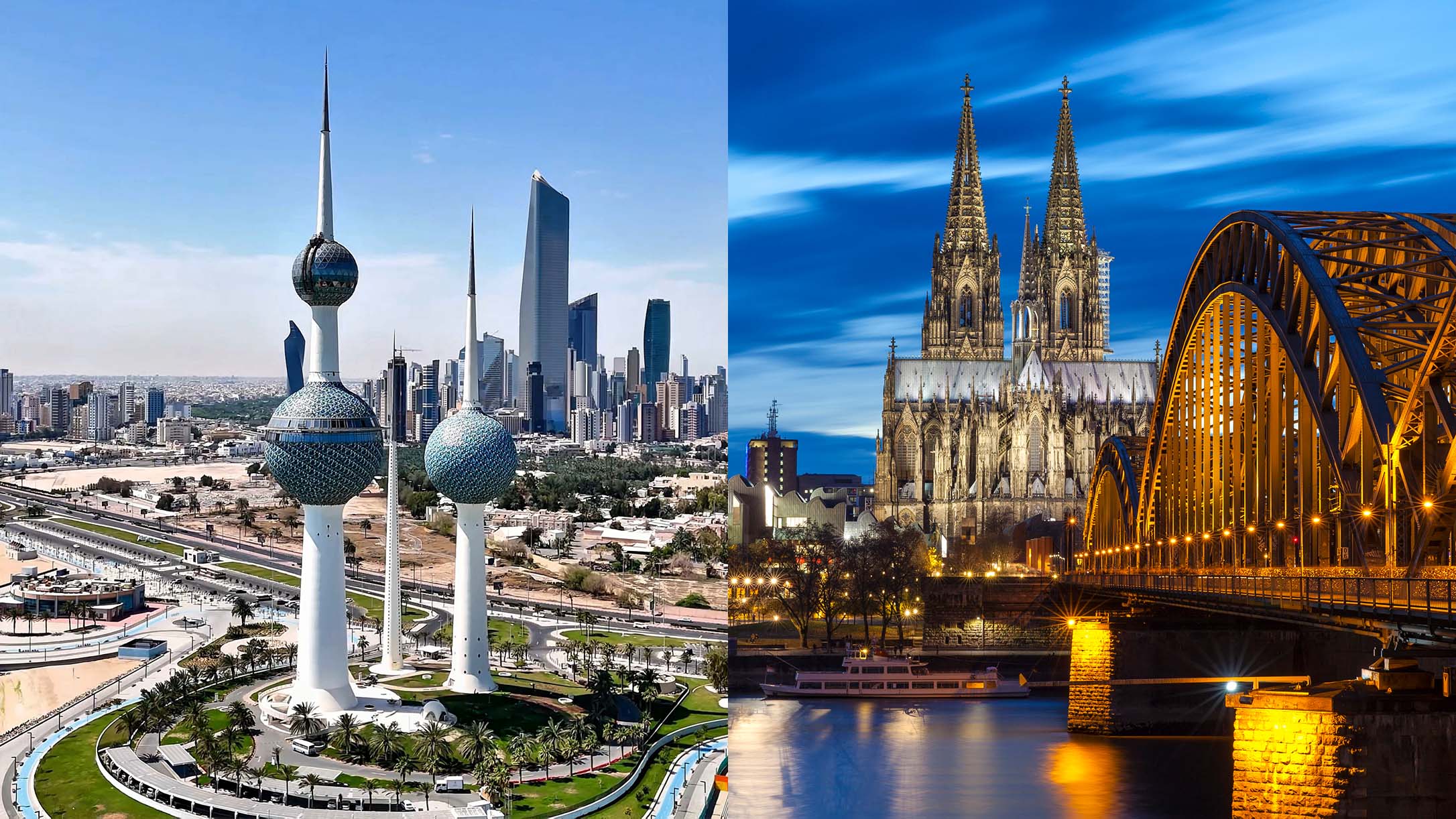
This series, entitled “Where the World and Kubota Intersect,” introduces the future that countries from all over the world envisioned at Expo 2025 Osaka, Kansai (Expo 2025) and describes the related social issues and how Kubota is involved.
This seventh installment looks at Kuwait, which is bringing water to dry land and building a future with limited resources, and Germany, which is pursuing urban and agricultural sustainability under the "Circular Economy” slogan. How does Kubota's technology intersect with and support the visions of these two countries for resolving issues? We will explore some of these aspects through the international stage of this Expo.
The State of Kuwait: Water for the Desert, Light for the Future

“الصديق وقت الضيق”
(A friend in need is a friend indeed): Kuwaiti proverb
Designed under the concept of VISIONARY LIGHTHOUSE, the Kuwait pavilion beautifully expressed the essence of the country’s natural landscapes, rich heritage, and forward-thinking vision, while weaving together a story of its developmental journey, its history of overcoming adversity, and the future being forged by its people.
Upon entering the pavilion, visitors were greeted by a spherical, pearl-shaped screen. Kuwait's history, once based on pearl diving and trade in the Arabian Gulf, is both its origin and a source of pride. The next display, in which desert creatures such as scorpions and lizards appear when the sand is moved aside, was popular.
Additionally, the miniature space that recreates a desert landscape, and interactive zones where visitors can enjoy dancing and games, allowed both adults and children to experience Kuwaiti culture together through play. Finally, a planetarium-like dome theater enveloped visitors allowing them to feel hope for the future beneath a starry night sky.

The cultural experience was also abundant. In addition to traditional cuisine, the pavilion restaurant served “elbah,” a sweet treat that has become a hot topic among visitors. With scents of saffron and pistachio, the flavor of this simple custard pudding abounded with exotic charm, and it was widely regarded as the most popular dessert at Expo 2025, also allowing visitors to get a glimpse of Kuwaiti life through its food culture.

However, behind these glamorous displays lies the harsh reality of severe water shortages. Kuwait, with virtually no renewable freshwater resources, relies on desalinated seawater for a staggering 92% of its domestic water, which makes it one of the most water-stressed countries in the world.
Being located in a scorching desert region, along with economic and urban development, securing freshwater resources has become critically strategic in determining the survival of the country. Securing water for drinking purposes, as well as for sustaining daily lifestyles, agriculture, and industry, is directly linked to daily existence.
For Middle Eastern countries, including Kuwait, whose wealth have been built on oil, what was needed more than anything else was pipelines to carry the "water of life." In addition to pipelines for safely transporting water over long distances, pumps to deliver it, and advanced technology to recycle it were also essential.
To address these issues, Kubota has long supported the development of water infrastructure in the country.
Since the 1970s, Kubota has been involved in Middle Eastern countries’ water supply projects (manufacturing and supplying pipelines), which could be called the lifelines protecting citizens’ lives.
In the 1980s, when expressways were expanded and elevated roads were constructed, Kubota was in charge of rerouting and burying existing water pipes, gas pipes, and electrical cables. Although this work, which required maintaining lifelines in parallel with transportation infrastructure projects, was challenging and came with many constraints, Kubota accomplished it with its solid technical expertise and planning capabilities, supporting urban growth.
Then in 2008, Kubota delivered "ultra-high-lift pumps" capable of lifting underground water 120 meters to a wastewater treatment center in Al Jahra. They had to be able to be resistant to blockages while efficiently pumping large volumes of sewage from deep underground, a technology that only a few companies in the world could achieve. Highly efficient, and with reduced construction and maintenance costs, the pumps were recognized as sustainable infrastructure for the country, and significantly contributed to minimized lifecycle costs as well.
Kubota's commitment doesn't end there. Pump installation is not simply a matter of supplying products; it is part of developing sustainable infrastructure, which includes post-installation maintenance and optimizing operational efficiency. Both as a manufacturer and an engineering company, Kubota develops pumps that cover uses in facilities from water purification plants through sewage treatment plants, and its pumps are supplied to seawater desalination plants and long-distance water transfer systems, and even high-pressure pumps for reverse osmosis (RO)*1. These comprehensive solutions function as the "invisible infrastructure" that protects the livelihoods of people not only in Kuwait but throughout the Middle East.
- *1. Reverse osmosis (RO) is a water treatment technology that purifies water by applying pressure to force it through an extremely fine filter called an RO membrane, removing salts, ions, and other impurities.
“Purify water. Transport water. Recycle water.”
Kubota's technology serves as an invisible lifeline that supports the livelihoods of people in Kuwait, quietly supporting the future of those living in the desert.
The Federal Republic of Germany: The Future of Cities and Agriculture Shaped by Circulation

“Jeder ist seines Gluecks Schmied”
(We are the creators of our happiness): German proverb
The German pavilion’s “Wa! Germany” theme used three Japanese keywords for “wa”: the “wa” of circulation, the “wa” of harmony, and the “wa!” of wonder, and its entire exhibition was focused around the core concept of a circular economy. The building was constructed with cylindrical wooden units, symbolizing circularity through its use of materials that can be reused even after dismantling.
Inside, mascot character “Circular” served as a handheld audio guide. Light- and vibration-reactive, Circular began an explanation corresponding to a specific exhibit when held over a wall sensor. By exploring the many touch points set up throughout the pavilion, visitors were able to interactively learn about how circular economy mechanisms work.
Among these, examples of cutting-edge agricultural practices implemented in Germany were introduced, such as farming using green electricity and pesticide-free cultivation in which lasers are used to identify and remove weeds. Visitors were able to have fun playing games while getting a glimpse of the future of sustainable agriculture.
Furthermore, through a mechanism that changes the viewpoint for each seat, as the theater space floor slowly rotates, visitors experienced the process by which resources circulate to shape society. Not only to be viewed, but the screen images also served as a catalyst that offers visitors an opportunity to begin thinking about how they can become involved in a circular society.
Thus far, Germany has been an industrial and cultural world leader in both industry and culture, and yet, there are issues to be resolved within the country. Particularly notable is the deterioration of urban infrastructure built after World War II. Bridges and roads, as well as water and sewage systems, among other social infrastructure constructed in the postwar era are aging, and the government expects to invest over tens of billions of euros for their redevelopment in the next 20 years.
Furthermore, accelerating the energy transition (Energiewende) is another major theme. Germany has set a goal to cover 80% of its electricity supply with renewable energy by 2030, and is working to transition to a decarbonized society while maintaining its competitiveness as an industrialized nation.
Meanwhile, in the agricultural sector, labor shortages and stricter environmental regulations are forcing farmers to achieve both labor savings and reduced environmental impact. The EU's “Farm to Fork Strategy” aims to reduce pesticide use by 50% by 2030, and Germany is playing a central role in achieving this goal. Against this backdrop, building “circular agriculture” models that utilize precision farming and automation technologies is becoming increasingly essential.

In Germany, which is confronted with these issues, Kubota is also exploring new roles to fill.
In the construction machinery sector, as investment expands into repairing aging roads and bridges, as well as urban redevelopment, Kubota's compact, maneuverable, small excavators and other construction machinery well-suited to urban construction work are demonstrating their true capabilities. Furthermore, while increasing the number of models equipped with Stage V engines that comply with Europe's strict exhaust and noise regulations, Kubota is also developing next-generation electrified machinery that has a reduced environmental impact, which is enhancing its ability to support sustainable urban development.
Additionally, initiating efforts to expand its future supply system and product lineup, starting in 2026, Kubota Baumaschinen GmbH, Kubota's German construction machinery manufacturing and sales company, plans to gradually begin production of mini excavators in Zweibrücken, Germany with the goal of increasing production capacity by approximately 40% by 2028.
Furthermore, in the agricultural sector, Kubota's smart agricultural machinery is opening up new possibilities amid the trend in Europe to promote the adoption of precision agriculture and digital technology. The M7 Series of large-sized tractors, which are suitable for large-scale upland farming in Germany, and automated technologies in agriculture that combine GPS and sensors, directly contribute to labor savings and efficient resource utilization. In addition, by integrating these with technologies such as AI-powered crop growth monitoring and variable fertilization, efforts to realize the "circular agriculture" that the EU prioritizes are becoming a reality.
Kubota's comprehensive solutions in both the construction machinery and agricultural machinery sectors align with this country's “circular” theme, and together they envision a sustainable future for human livelihoods.
The shape of the future varies depending on the country and region.
The challenges to bring water to arid deserts, and the endeavors to recycle resources in established cities. Efforts being made in these two nations contrasting both in climate and geography intersect on a single point: sustainability.
The paths that Kuwait and Germany show reflect a shared desire to build technological and societal foundations that sustain life. At their intersection, Kubota's technology on-site is quietly supporting a future where water flows through the desert and sustainability takes root in cities.

